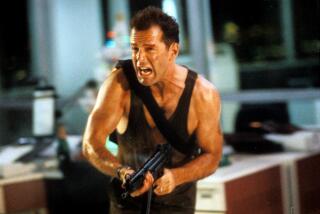Laughs, lessons with Bernie
- Share via
BERNIE Brillstein, who died Thursday at age 77, did a thousand things in show business, but he was one of a kind: agent, manager, producer, executive, raconteur, confidant, great source for lowly reporters in search of a good quote or a great tip.
I first met him years ago on the set of a movie that was going down the drain, but you’d hardly know it from Bernie’s demeanor. He always had an easy smile, a funny remark and the attitude that whatever was going wrong couldn’t possibly spoil his day.
When I started writing a column, he’d take me to lunch or call me with suggestions, quips and encouragement, as in: “Hey, you haven’t written anything bad about Mike Ovitz for weeks. What are you waiting for?”
For years, Bernie had a regular monthly lunch at Hillcrest Country Club with two old pals, Jerry Seinfeld’s managers George Shapiro and Howard West, who got their start, with Bernie, in the William Morris mailroom in the mid-1950s. I was occasionally invited as a guest. Everything was off the record -- although, ironically, they had a tape recorder on the table, saving everything for posterity. As Bernie joked: “We’re getting so old that soon this will be the only way we’ll be able to remember all the stories.” I hope the tapes are being well preserved -- they’ll be a treasure trove for some future showbiz historian.
At lunch, Bernie always had plenty to say about the current state of affairs, firm in his opinion about which studio chief was a total moron, which agency was in total disarray and what network chief wouldn’t know a hit show if it bit him on the tuchis. But I especially loved hearing tales from the Morris mailroom, which for decades was the launching pad for all of Hollywood’s kingpins, including David Geffen, Barry Diller, Ovitz, and current CAA barons Bryan Lourd and Kevin Huvane. (With loads of help from Bernie, David Rensin wrote a fabulous book in 2003, “The Mailroom: Hollywood History From the Bottom Up,” that is an oral history of the chicanery and escapades that occurred on the premises.)
Every day in the mailroom was an adventure, whether you were delivering a package to Zsa Zsa Gabor’s apartment (she would often come to the door in a negligee) or rushing across the street -- as Bernie once did -- to buy the young Elvis Presley a sweater when he was stuck in a chilly dressing room waiting to appear on a variety show.
Back in the 1950s, WMA mailroom flunkies made a pittance, but somehow Bernie managed to live like a prince.
When I heard this morning that Bernie died, I called up Irwin Winkler, producer of “Raging Bull,” “GoodFellas” and dozens of other great films, and also a mailroom graduate from Bernie’s era. “Bernie was a guy who knew how to live,” Winkler recalls. “Even when we only had $40 a week, let me assure you, Bernie spent all $40 and more. We were poor, we’d both just gotten married, but when our checks would come every other Friday, we’d go right out and splurge.”
Winkler remembers that Brillstein somehow had access to tickets for every hot Broadway show in town.
“He’d say, ‘Let’s go see a show,’ and take me to ‘My Fair Lady’ or ‘Gypsy,’ whatever the great show of the moment was. He always had tickets. And he never let you put your hand in your pocket. He’d pay for everything. Bernie taught me a lot of things, starting with knowing how to laugh at everything, even adversity. He just knew how to live.”
Everyone has a favorite Brillstein story. Here’s one he loved to tell that perfectly captures Bernie’s wry take on the showbiz life:
Back in the day, mailroom employees were often dispatched to deliver big checks to prominent WMA clients. As Bernie once recalled (this version is from Rensin’s oral history), he was given orders to personally deliver a $25,000 check to Red Buttons, then one of the agency’s top comedians.
“I knew what was in the envelope because, like any ambitious guy with a head on his shoulders, I opened all the interesting-looking letters and packages before handing them over. Everyone did it, because information is king. In the office, I’d go into the men’s room, run the water as hot as possible and wait for the steam to do the rest. I’d read and then carefully reseal. I’d find client lists, personal correspondence, checks. I never worried about being caught, because usually another guy from the mailroom was at the next sink doing the same thing.
“When Buttons answered the door, he took the envelope and looked inside. He didn’t notice, or didn’t care, that it had been tampered with. Then he handed me a quarter tip. That works out to 1/100,000 of the check I’d delivered. I didn’t take the money. I said, ‘I’m not allowed to.’ But I did take away a valuable lesson about the parsimony of comedians. And to be honest, had it been a dollar, I probably would have grabbed it.”
Whenever Bernie and I had lunch at Hillcrest, he never let me pick up a check. “Save your money for a big score,” he’d say. It hardly mattered that I wasn’t a client. As always, when it came to navigating the often turbulent waters of show business, Bernie gave the best advice.
--
This item and others can be found on the Big Picture blog at latimes.com/thebigpicture
More to Read
The biggest entertainment stories
Get our big stories about Hollywood, film, television, music, arts, culture and more right in your inbox as soon as they publish.
You may occasionally receive promotional content from the Los Angeles Times.










